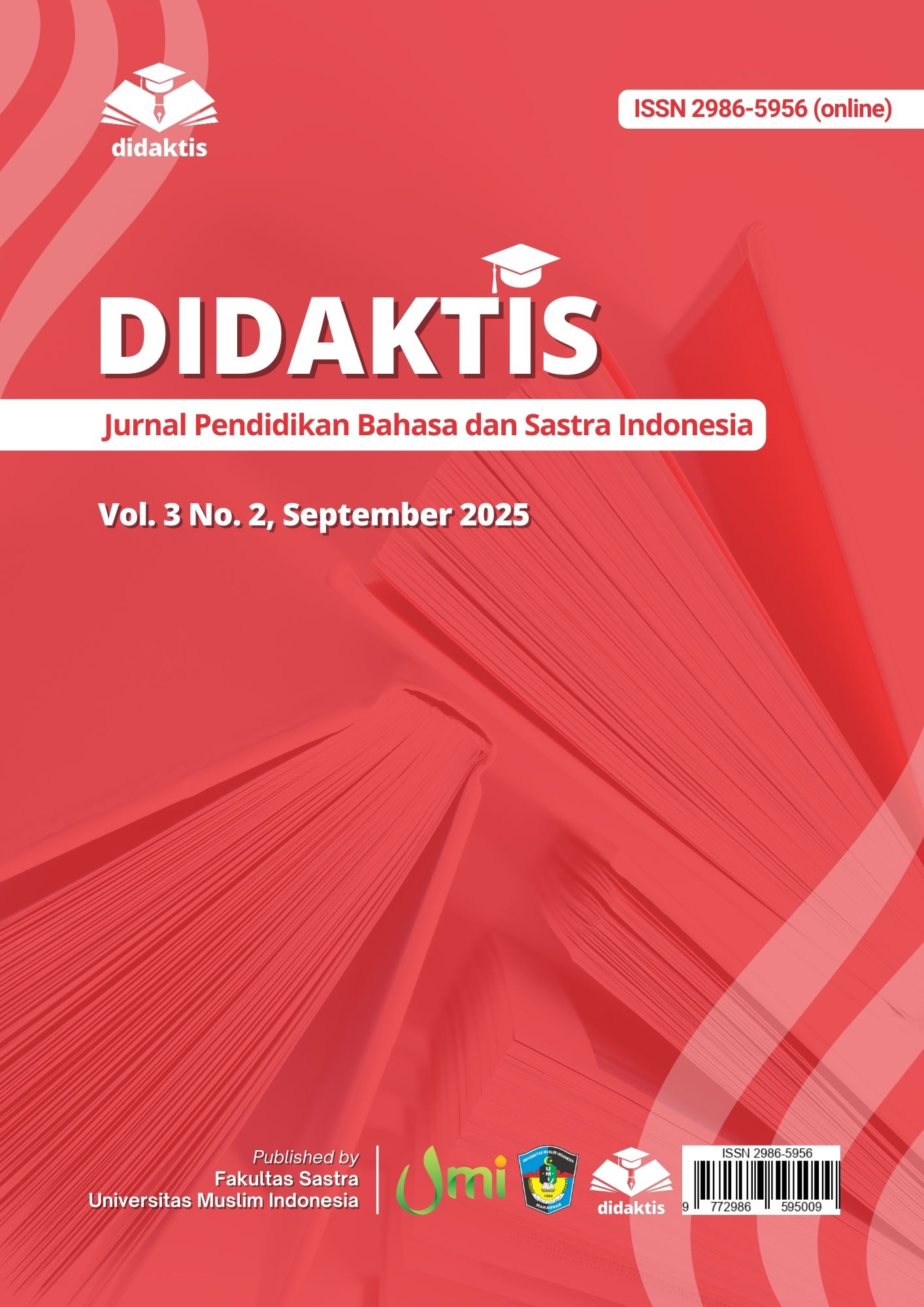Relasi Kuasa dan Wacana Resistensi dalam Novel Janji Karya Tere Liye Perspektif Michel Foucault
DOI:
https://doi.org/10.33096/didaktis.v3i2.919Keywords:
power relations, discourse analysis, Michel Foucault, Tere Liye’s JanjiAbstract
This study aims to analyze the forms and dynamics of power relations in Tere Liye’s novel Janji through Michel Foucault’s theory of discourse and power. The research employs a qualitative method with a Foucauldian discourse analysis approach to examine how power operates, spreads, and produces truth within the novel’s social context. The data consist of textual excerpts that illustrate elements of surveillance, discipline, and resistance. The findings reveal that power in Janji is not monolithic or merely repressive but rather productive and diffused across three major domains: mental control through normalization and surveillance, bodily discipline through social and institutional mechanisms, and social domination maintained through economic and symbolic power. On the other hand, acts of resistance emerge as counter-discourses performed by the main character, demonstrating that power always allows space for opposition and social transformation. The study concludes that Janji reflects the complexity of power relations that not only constrain but also shape individual identity, behavior, and awareness within social networks, emphasizing the importance of critical consciousness toward the mechanisms of power embedded in everyday life.
Downloads
References
Addina, N., & Hanif, M. (2024). Pendidikan dan Kekuasaan: Antara Pembebasan dan Dominasi Perspektif Michel Foucault, Pierre Bourdieu, dan Paulo Freire. Jurnal Ilmu Pendidikan dan Pemikiran Islam, 2(1), 34–47. https://doi.org/10.31004/fdswm377
Andriani, I. (2024). Analisis Wacana Kritis Model Foucault dalam Berita “Tangis Goenawan Mohamad dan Ambisi Kekuasaan Jokowi” pada Kompas.com. Sitasi Ilmiah, 2(1), 40–49. https://ejournal.unma.ac.id/index.php/si/article/view/8252
Foucault, M. (2002). The Archaeology of Knowledge. London: Routledge.
Foucault, M. (2019). Power: The Essential Works of Michel Foucault 1954–1984. London: Penguin Books.
Latupeirissa, E., & Tjahjono, T. (2021). Relasi Kekuasaan, Pengetahuan dan Moral Tokoh Bujang dalam Novel Pulang Karya Tere Liye (Kajian Relasi Kuasa Michel Foucault). Sastranesia, 9(4), 17–29. https://doi.org/10.32682/sastranesia.v9i4.2195
Liye, T. (2021). Janji. Depok: Sabak Grip Nusantara.
Lulyastuti, L., & Satriani, I. (2025). Relasi Kuasa dalam Novel Anjing Mengeong, Kucing Menggonggong Karya Eka Kurniawan: Perspektif Michael Foucault. DIDAKTIS: Jurnal Pendidikan Bahasa Dan Sastra Indonesia, 3(1), 1-8. https://doi.org/10.33096/ didaktis.v3i1.789
Narendra, B. N., Syarifuddin, R., & Fadlullah, Y. A. (2024). Analisis Wacana Kritis: Teori dan Metode Kerangka Sosial dan Sastra. Jurnal Deiksis, 4(1), 44–60. https://pusdig.my.id/dieksis/ article/view/396
Nasution, S. Y. (2024). Relasi Kuasa dalam Novel Rindu Kubawa Pulang Karya S. Baya: Analisis Wacana Kritis Michel Foucault. Al-Furqan: Jurnal Agama, Sosial, dan Budaya, 3(1), 196–216. https://publisherqu.com/index.php/Al-Furqan/article/view/832
Poorghorban, Y. (2023). On Michel Foucault: Power/Knowledge, Discourse, and Subjectivity. OKARA: Jurnal Bahasa dan Sastra, 17(2), 318–328. https://doi.org/10.19105/ ojbs.v17i2.9749
Pratama, R. A. (2023). Pemikiran Foucault dan Baron: Kekuasaan dan Pengetahuan dalam Pendidikan dan Bahasa. Jurnal Filsafat Indonesia, 4(1), 45–57. https://doi.org/10.23887/ jfi.v4i1.30543
Rafillah, R. A. (2025). Wacana Kuasa ala Foucault atas Peran Negara dan Institusi dalam Melanggengkan Ketimpangan Kuasa pada Anak Perempuan Korban Kekerasan Seksual di Pontang, Serang. Jurnal Ilmiah Nusantara (JINU), 2(5), 1–22. : https://doi.org/10.61722/ jinu.v2i5.5177
Satriani, I. (2016). Postmodernisme dalam Novel Bilangan Fu Karya Ayu Utami. Retorika: Jurnal Bahasa, Sastra, dan Pengajarannya, 9(1), 25–32. https://doi.org/10.26858/retorika. v9i1.3790
Siswadi, G. A. (2024). Relasi Kuasa terhadap Konstruksi Pengetahuan di Sekolah Perspektif Michel Foucault dan Refleksi atas Sistem Pendidikan di Indonesia. Sang Acharya: Jurnal Profesi Guru, 5(1), 1-15. https://doi.org/10.25078/sa.v5i1.3405
Syafiqah, S. (2023). Postmodernisme dalam Novel Rantai Renjana Karya Niken Aqueensha. Totobuang, 11(2), 231–242. https://doi.org/10.26499/totobuang.v11i2.469
Utama, N. G., & Dinanti, P. A. (2024). The Depiction of Power Relations in Wish (2023) Through Foucauldian Perspective. LANGUAGE : Jurnal Inovasi Pendidikan Bahasa Dan Sastra, 5(3), 188-197. https://doi.org/10.51878/language.v5i3.6526
Wellek, R., & Warren, A. (2016). Teori Kesusastraan. Jakarta: Gramedia Pustaka Utama.
Downloads
Published
Issue
Section
License
Copyright (c) 2025 Atika Suri Ramadani, Irma Satriani

This work is licensed under a Creative Commons Attribution-ShareAlike 4.0 International License.

























